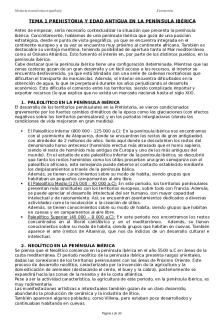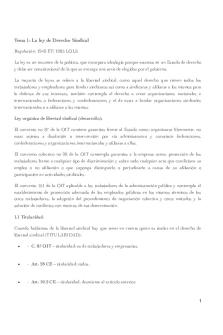Teamwork - temario completo examen PDF

| Title | Teamwork - temario completo examen |
|---|---|
| Author | Isabella Vargas González |
| Course | Teamwork, Mòdul 1 |
| Institution | Universitat d'Andorra |
| Pages | 2 |
| File Size | 78.7 KB |
| File Type | |
| Total Downloads | 102 |
| Total Views | 138 |
Summary
Apunts sobre la teoria que sortirà a l'examen escrit del Seminari de Treball en Equip....
Description
Basic Elements of Cooperative Learning 1. Positive interdependence. This is structured by assigning each student a role. Positive rewarding interdependence is structured by giving a reward to the group if each student individually has gotten a good result. All cooperative learning starts with a mutually shared group goal. All the members need each other’s success in order to succeed. 2. Face-to-face interaction: students help, assist, encourage and support each other. 3. Individual accountability: each student is assessed individually. Every member deserves a different feedback. “Each student should walk away stronger”. This can be assured by individual tests. 4. Social skills: working in leadership, decision-making, trust-building, communication and conflict-management skills. 5. Group processing: asking the group to highlight something helpful that did each member of the group and something they’ll remember tomorrow about their participation. This enables group maintenance, learning of social skills, members receive feedback on their participation and reminds students to practice the small group skills required to work cooperatively.
Interview to Dr. Roger Johnson - Cooperative vs Competitive Learning 1- Why using cooperative learning in a competitive world? Because the world isn’t as competitive as we usually think. One may have to compete with other people for a better grade, or even for a job, but our society in general is based on cooperation. As individuals, we don’t have to do all the tasks required to harvest food, or to auto-diagnose ourselves if we feel sick. People have a certain role in society, each one of us have a certain duty and everyone should do it correctly so society continues working. 2- Does cooperative learning work for any type of student? Why? Yes, it does, because the students who understand the syllabus better have the opportunity to explain the topics to those who aren’t as advanced. This way, the first student gets to repeat and practice what they had already learnt, and the second one nurtures from their knowledge and gets an explanation from another point of view.
Universitat d’Andorra Ciències de l’Educació Mòdul 1 - Teamwork
Types of learning Cooperation
Competition
Individualistic
Learners work in small groups. Groups are heterogeneous.
Learners work alone.
Learners work alone.
Lessons are structured so that learners work together to maximize their own and each other’s learning. Learners work together to achieve shared goals.
Instructors structure lessons so that learners compete with each other to achieve a goal only a few can attain.
Learners work by themselves to accomplish learning goals unrelated to those of other learners.
All members of the group strive for all group members’ success.
They strive to be better than the rest of the group. What benefits self, deprives others.
Strive for their own success. What benefits self does not affect others.
Joint success is celebrated
Own success and others’ failure is celebrated. Rewards are limited.
Own success is celebrated
Every student should walk away stronger from a team.
Universitat d’Andorra Ciències de l’Educació Mòdul 1 - Teamwork...
Similar Free PDFs

Temario completo
- 11 Pages

Temario Completo 2
- 61 Pages

TEMARIO FILOSOFÍA COMPLETO
- 137 Pages

Reporterismo - Temario completo
- 27 Pages

Temario completo - Apuntes todos
- 24 Pages

Apuntes, temario completo
- 53 Pages

Apuntes, temario completo
- 58 Pages

Protocolo (temario completo)
- 41 Pages

HEE temario completo. Lidia
- 70 Pages

Apuntes TICS - temario completo
- 29 Pages

Sindical Temario Completo
- 34 Pages

Apuntes, temario completo
- 66 Pages

Apuntes, temario completo
- 15 Pages

Temario completo Criminología
- 68 Pages
Popular Institutions
- Tinajero National High School - Annex
- Politeknik Caltex Riau
- Yokohama City University
- SGT University
- University of Al-Qadisiyah
- Divine Word College of Vigan
- Techniek College Rotterdam
- Universidade de Santiago
- Universiti Teknologi MARA Cawangan Johor Kampus Pasir Gudang
- Poltekkes Kemenkes Yogyakarta
- Baguio City National High School
- Colegio san marcos
- preparatoria uno
- Centro de Bachillerato Tecnológico Industrial y de Servicios No. 107
- Dalian Maritime University
- Quang Trung Secondary School
- Colegio Tecnológico en Informática
- Corporación Regional de Educación Superior
- Grupo CEDVA
- Dar Al Uloom University
- Centro de Estudios Preuniversitarios de la Universidad Nacional de Ingeniería
- 上智大学
- Aakash International School, Nuna Majara
- San Felipe Neri Catholic School
- Kang Chiao International School - New Taipei City
- Misamis Occidental National High School
- Institución Educativa Escuela Normal Juan Ladrilleros
- Kolehiyo ng Pantukan
- Batanes State College
- Instituto Continental
- Sekolah Menengah Kejuruan Kesehatan Kaltara (Tarakan)
- Colegio de La Inmaculada Concepcion - Cebu

